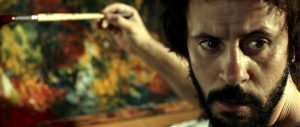

The best way to see "Mars at Sunrise", the clever first feature from director Jessica Habie, is probably with a solid understanding of the border conflicts between Israel and Palestine. Then again, maybe that's Habie's point: the conflicts are terribly difficult to understand. When the film's hero Khaled (Ali Suliman), a painter from the West Bank, is displaced from his job and home in East Jerusalem, the reasons aren't entirely clear---did he do something wrong? Something illegal? Anything at all to be suspicious? Nor is it obvious why the Israeli solider, Eyal (Guy El Hanan), breaks into Khaled's home, assaults his art, and takes Khaled prisoner. The only that thing that does remain clear is Khaled's artistic resilience.
"Mars at Sunrise" doesn't make that resilience look as wish-washy as it might sound. The film is too trippy and carnivalesque to be sweetly cathartic about the power of art. You never quite know what’s going on. Especially once Eyal locks Khaled up in the desert, a sense of structure wriggles: every-time Khaled opens the slot of his cellar door he sees something different, from a woman playing the violin with an invisible bow, to the eyes of his mother flashing before him, to Eyal offering him a big plate of red meat. It’s all bizarre and shifty. Maybe the wonderful delirium is born from Khaled’s exhaustion and frailty amidst Eyal’s torture, or maybe it’s his unwavering artistic visions, a bit strained, but still drawing from memories and his own poet’s eye.
In either case, Eyal is ironically the one who can’t keep it together. A restless yet exhausted soldier, Eyal is very intimate with Israel’s many frustrating border checks. He categorizes people as “this” or “that” based on the contents of their ID papers. It's a thankless job. At one point, a flirty-eyed Eyal allows two girls through the check. One expresses gratitude. The other replies under her breath, "No soldier is nice". Like Khaled, Eyal is a painter, too, but theoretically clear-cut rules, carrying a gun, and irritating travelers are what he knows better than putting a wet paintbrush to a blank canvas. Even when the brash young man rudely paints over a portrait of Khaled's that he claims to admire, he draws harsh, black, grid-like lines---the signature of someone unsure and hostile. In another scene, the vegetables on his dinner plate are neatly cut and separated. He stares at them with what seems pleasure and restraint. They’re like swatches of paint on a palette that Eyal doesn’t dare swirl together.
Khaled doesn't operate with such divisiveness, creating a taut energy between him and Eyal that lends a convincing volatility to the cracks Khaled receives across the face from his captor on more than one occasion. It's Khaled's opinion that things can't be sliced and diced so completely and when they are, it's an impressive illusion. Colors are Khaled's thing and he says they "can't be trusted". According to Khaled, colors always trying to prove what they're not: blue is not green or red, and the shining sun better understand that, says blue! As an artist, though, Khaled knows that colors are shades of each other. His discussion of this---all delivered in Suliman’s soothing timbre----is the highlight of “Mars at Sunrise”.
For long stretches, “Mars at Sunrise” feels too much like a busy collage of blood-motifs, strange faces, and blended settings. It’s hard to have a reaction to any of its topsy-turviness. But then Habie gives us a scene concrete in its tenderness, such as when Khaled’s worried-sick folks knock on the door of his home, waiting and waiting for him to answer with a fine-tuned patience that suggests years of trying to remain close with their child. They need to see him, to hold him. Brief and balmy moments like this importantly keep “Mars at Sunrise” from being all aesthetic. They provide a nice bedrock of support for Khaled's artistic tunnel vision. However confusing, "Mars at Sunrise" puts real people and ideas---not just beguiling abstractions of them--- at stake. It makes you wonder what other tricks Habie might have up her sleeve. For all of her film's contorting circumstances and dream-like sequences, she keeps it real.